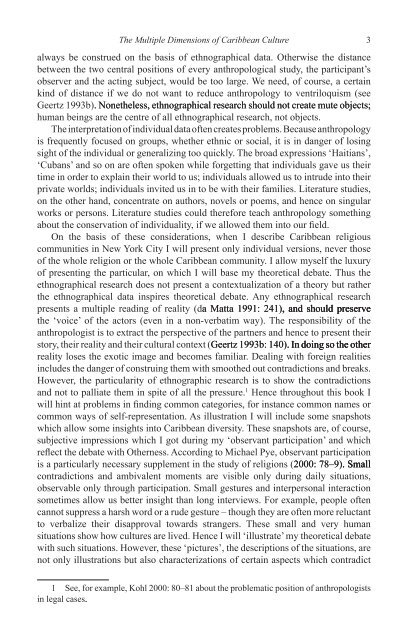You also want an ePaper? Increase the reach of your titles
YUMPU automatically turns print PDFs into web optimized ePapers that Google loves.
The Multiple Dimensions <strong>of</strong> <strong>Caribbean</strong> Culture 3<br />
always be construed on <strong>the</strong> basis <strong>of</strong> ethnographical data. O<strong>the</strong>rwise <strong>the</strong> distance<br />
between <strong>the</strong> two central positions <strong>of</strong> every anthropological study, <strong>the</strong> participant’s<br />
observer and <strong>the</strong> act<strong>in</strong>g subject, would be too large. We need, <strong>of</strong> course, a certa<strong>in</strong><br />
k<strong>in</strong>d <strong>of</strong> distance if we do not want to reduce anthropology to ventriloquism (see<br />
Geertz 1993b). None<strong>the</strong>less, ethnographical research should not create mute objects;<br />
human be<strong>in</strong>gs are <strong>the</strong> centre <strong>of</strong> all ethnographical research, not objects.<br />
The <strong>in</strong>terpretation <strong>of</strong> <strong>in</strong>dividual data <strong>of</strong>ten creates problems. Because anthropology<br />
is frequently focused on groups, whe<strong>the</strong>r ethnic or social, it is <strong>in</strong> danger <strong>of</strong> los<strong>in</strong>g<br />
sight <strong>of</strong> <strong>the</strong> <strong>in</strong>dividual or generaliz<strong>in</strong>g too quickly. The broad expressions ‘Haitians’,<br />
‘Cubans’ and so on are <strong>of</strong>ten spoken while forgett<strong>in</strong>g that <strong>in</strong>dividuals gave us <strong>the</strong>ir<br />
time <strong>in</strong> order to expla<strong>in</strong> <strong>the</strong>ir world to us; <strong>in</strong>dividuals allowed us to <strong>in</strong>trude <strong>in</strong>to <strong>the</strong>ir<br />
private worlds; <strong>in</strong>dividuals <strong>in</strong>vited us <strong>in</strong> to be with <strong>the</strong>ir families. Literature studies,<br />
on <strong>the</strong> o<strong>the</strong>r hand, concentrate on authors, novels or poems, and hence on s<strong>in</strong>gular<br />
works or persons. Literature studies could <strong>the</strong>refore teach anthropology someth<strong>in</strong>g<br />
about <strong>the</strong> conservation <strong>of</strong> <strong>in</strong>dividuality, if we allowed <strong>the</strong>m <strong>in</strong>to our field.<br />
On <strong>the</strong> basis <strong>of</strong> <strong>the</strong>se considerations, when I describe <strong>Caribbean</strong> religious<br />
communities <strong>in</strong> <strong>New</strong> <strong>York</strong> <strong>City</strong> I will present only <strong>in</strong>dividual versions, never those<br />
<strong>of</strong> <strong>the</strong> whole religion or <strong>the</strong> whole <strong>Caribbean</strong> community. I allow myself <strong>the</strong> luxury<br />
<strong>of</strong> present<strong>in</strong>g <strong>the</strong> particular, on which I will base my <strong>the</strong>oretical debate. Thus <strong>the</strong><br />
ethnographical research does not present a contextualization <strong>of</strong> a <strong>the</strong>ory but ra<strong>the</strong>r<br />
<strong>the</strong> ethnographical data <strong>in</strong>spires <strong>the</strong>oretical debate. Any ethnographical research<br />
presents a multiple read<strong>in</strong>g <strong>of</strong> reality (da Matta 1991: 241), and should preserve<br />
<strong>the</strong> ‘voice’ <strong>of</strong> <strong>the</strong> actors (even <strong>in</strong> a non-verbatim way). The responsibility <strong>of</strong> <strong>the</strong><br />
anthropologist is to extract <strong>the</strong> perspective <strong>of</strong> <strong>the</strong> partners and hence to present <strong>the</strong>ir<br />
story, <strong>the</strong>ir reality and <strong>the</strong>ir cultural context (Geertz 1993b: 140). In do<strong>in</strong>g so <strong>the</strong> o<strong>the</strong>r<br />
reality loses <strong>the</strong> exotic image and becomes familiar. Deal<strong>in</strong>g with foreign realities<br />
<strong>in</strong>cludes <strong>the</strong> danger <strong>of</strong> constru<strong>in</strong>g <strong>the</strong>m with smoo<strong>the</strong>d out contradictions and breaks.<br />
However, <strong>the</strong> particularity <strong>of</strong> ethnographic research is to show <strong>the</strong> contradictions<br />
and not to palliate <strong>the</strong>m <strong>in</strong> spite <strong>of</strong> all <strong>the</strong> pressure. 1 Hence throughout this book I<br />
will h<strong>in</strong>t at problems <strong>in</strong> f<strong>in</strong>d<strong>in</strong>g common categories, for <strong>in</strong>stance common names or<br />
common ways <strong>of</strong> self-representation. As illustration I will <strong>in</strong>clude some snapshots<br />
which allow some <strong>in</strong>sights <strong>in</strong>to <strong>Caribbean</strong> diversity. These snapshots are, <strong>of</strong> course,<br />
subjective impressions which I got dur<strong>in</strong>g my ‘observant participation’ and which<br />
reflect <strong>the</strong> debate with O<strong>the</strong>rness. Accord<strong>in</strong>g to Michael Pye, observant participation<br />
is a particularly necessary supplement <strong>in</strong> <strong>the</strong> study <strong>of</strong> religions (2000: 78–9). Small<br />
contradictions and ambivalent moments are visible only dur<strong>in</strong>g daily situations,<br />
observable only through participation. Small gestures and <strong>in</strong>terpersonal <strong>in</strong>teraction<br />
sometimes allow us better <strong>in</strong>sight than long <strong>in</strong>terviews. For example, people <strong>of</strong>ten<br />
cannot suppress a harsh word or a rude gesture – though <strong>the</strong>y are <strong>of</strong>ten more reluctant<br />
to verbalize <strong>the</strong>ir disapproval towards strangers. These small and very human<br />
situations show how cultures are lived. Hence I will ‘illustrate’ my <strong>the</strong>oretical debate<br />
with such situations. However, <strong>the</strong>se ‘pictures’, <strong>the</strong> descriptions <strong>of</strong> <strong>the</strong> situations, are<br />
not only illustrations but also characterizations <strong>of</strong> certa<strong>in</strong> aspects which contradict<br />
1 See, for example, Kohl 2000: 80–81 about <strong>the</strong> problematic position <strong>of</strong> anthropologists<br />
<strong>in</strong> legal cases.


















